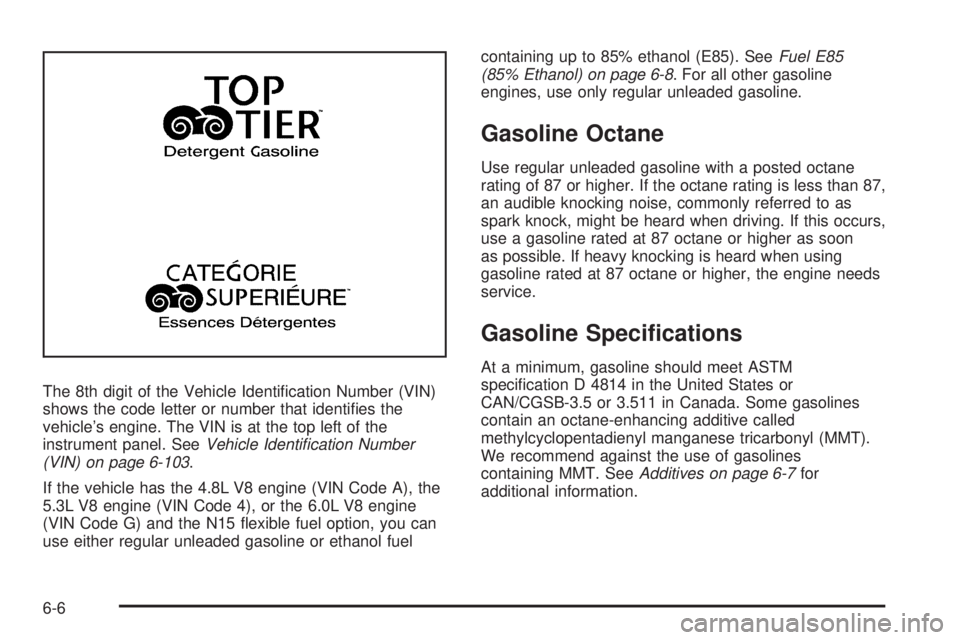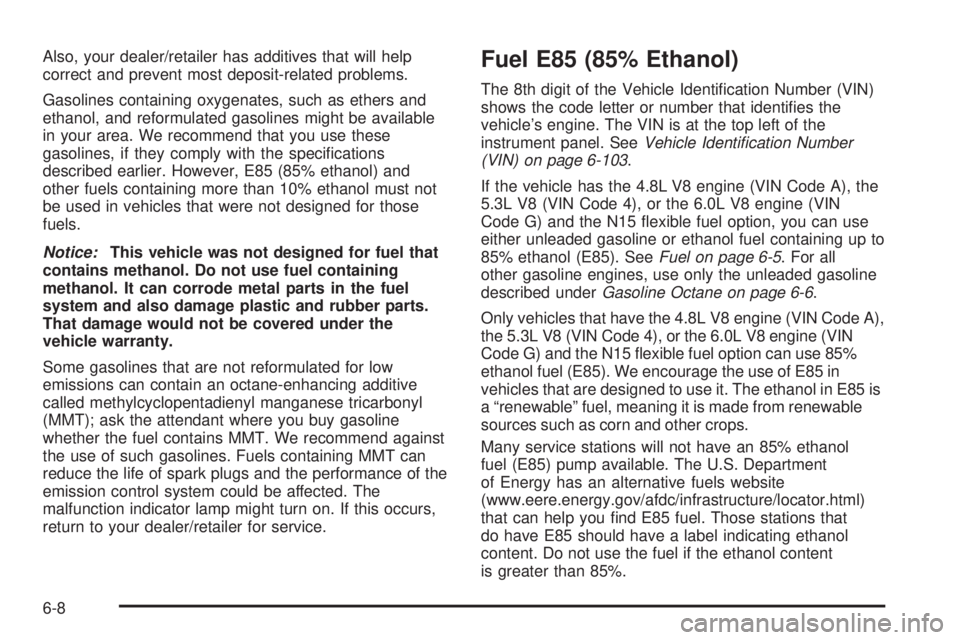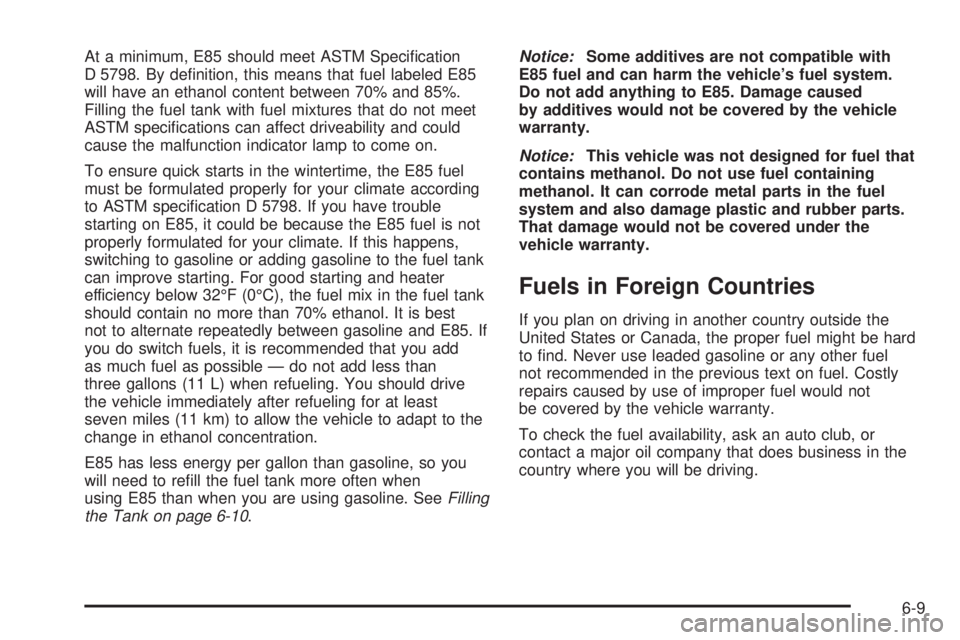2010 GMC SAVANA fuel additives
[x] Cancel search: fuel additivesPage 263 of 424

Service............................................................6-3
Accessories and Modifications..........................6-3
California Proposition 65 Warning.....................6-4
California Perchlorate Materials Requirements.....6-4
Doing Your Own Service Work.........................6-4
Adding Equipment to the Outside of the
Vehicle......................................................6-5
Fuel................................................................6-5
Gasoline Octane............................................6-6
Gasoline Specifications....................................6-6
California Fuel...............................................6-7
Additives.......................................................6-7
Fuel E85 (85% Ethanol)..................................6-8
Fuels in Foreign Countries...............................6-9
Filling the Tank............................................6-10
Filling a Portable Fuel Container.....................6-12
Checking Things Under the Hood....................6-12
Hood Release..............................................6-13
Engine Compartment Overview.......................6-14
Engine Oil...................................................6-15
Engine Oil Life System..................................6-18
Engine Air Cleaner/Filter................................6-19
Automatic Transmission Fluid (4-Speed
Transmission)...........................................6-20
Automatic Transmission Fluid (6-Speed
Transmission)...........................................6-23Cooling System............................................6-26
Engine Coolant.............................................6-28
Engine Overheating.......................................6-33
Engine Fan Noise.........................................6-34
Power Steering Fluid.....................................6-35
Windshield Washer Fluid................................6-36
Brakes........................................................6-37
Battery........................................................6-40
Jump Starting...............................................6-41
All-Wheel Drive.............................................
.6-45
Rear Axle.......................................................6-46
Front Axle......................................................6-46
Noise Control System.....................................6-47
Tampering with Noise Control System
Prohibited.................................................6-47
Bulb Replacement..........................................6-48
Halogen Bulbs..............................................6-49
Headlamps..................................................6-49
Front Turn Signal, Sidemarker and Parking
Lamps .....................................................6-51
Center High-Mounted Stoplamp (CHMSL).........6-51
Taillamps.....................................................6-52
License Plate Lamp......................................6-53
Replacement Bulbs.......................................6-53
Windshield Wiper Blade Replacement..............6-54
Section 6 Service and Appearance Care
6-1
Page 268 of 424

The 8th digit of the Vehicle Identification Number (VIN)
shows the code letter or number that identifies the
vehicle’s engine. The VIN is at the top left of the
instrument panel. SeeVehicle Identi�cation Number
(VIN) on page 6-103.
If the vehicle has the 4.8L V8 engine (VIN Code A), the
5.3L V8 engine (VIN Code 4), or the 6.0L V8 engine
(VIN Code G) and the N15 flexible fuel option, you can
use either regular unleaded gasoline or ethanol fuelcontaining up to 85% ethanol (E85). SeeFuel E85
(85% Ethanol) on page 6-8. For all other gasoline
engines, use only regular unleaded gasoline.
Gasoline Octane
Use regular unleaded gasoline with a posted octane
rating of 87 or higher. If the octane rating is less than 87,
an audible knocking noise, commonly referred to as
spark knock, might be heard when driving. If this occurs,
use a gasoline rated at 87 octane or higher as soon
as possible. If heavy knocking is heard when using
gasoline rated at 87 octane or higher, the engine needs
service.
Gasoline Speci�cations
At a minimum, gasoline should meet ASTM
specification D 4814 in the United States or
CAN/CGSB-3.5 or 3.511 in Canada. Some gasolines
contain an octane-enhancing additive called
methylcyclopentadienyl manganese tricarbonyl (MMT).
We recommend against the use of gasolines
containing MMT. SeeAdditives on page 6-7for
additional information.
6-6
Page 269 of 424

California Fuel
If the vehicle is certified to meet California Emissions
Standards, it is designed to operate on fuels that
meet California specifications. See the underhood
emission control label. If this fuel is not available
in states adopting California emissions standards, the
vehicle will operate satisfactorily on fuels meeting federal
specifications, but emission control system performance
might be affected. The malfunction indicator lamp
could turn on and the vehicle might fail a smog-check
test. SeeMalfunction Indicator Lamp on page 4-31.
If this occurs, return to your authorized dealer/retailer for
diagnosis. If it is determined that the condition is
caused by the type of fuel used, repairs might not be
covered by the vehicle warranty.
Additives
To provide cleaner air, all gasolines in the United States
are now required to contain additives that help prevent
engine and fuel system deposits from forming, allowing
the emission control system to work properly. In
most cases, nothing should have to be added to the
fuel. However, some gasolines contain only the
minimum amount of additive required to meet U.S.
Environmental Protection Agency regulations. To help
keep fuel injectors and intake valves clean, or if the
vehicle experiences problems due to dirty injectors or
valves, look for gasoline that is advertised as TOP TIER
Detergent Gasoline.
For customers who do not use TOP TIER Detergent
Gasoline regularly, one bottle of GM Fuel System
Treatment PLUS, added to the fuel tank at every engine
oil change, can help clean deposits from fuel injectors
and intake valves. GM Fuel System Treatment PLUS is
the only gasoline additive recommended by General
Motors.
6-7
Page 270 of 424

Also, your dealer/retailer has additives that will help
correct and prevent most deposit-related problems.
Gasolines containing oxygenates, such as ethers and
ethanol, and reformulated gasolines might be available
in your area. We recommend that you use these
gasolines, if they comply with the specifications
described earlier. However, E85 (85% ethanol) and
other fuels containing more than 10% ethanol must not
be used in vehicles that were not designed for those
fuels.
Notice:This vehicle was not designed for fuel that
contains methanol. Do not use fuel containing
methanol. It can corrode metal parts in the fuel
system and also damage plastic and rubber parts.
That damage would not be covered under the
vehicle warranty.
Some gasolines that are not reformulated for low
emissions can contain an octane-enhancing additive
called methylcyclopentadienyl manganese tricarbonyl
(MMT); ask the attendant where you buy gasoline
whether the fuel contains MMT. We recommend against
the use of such gasolines. Fuels containing MMT can
reduce the life of spark plugs and the performance of the
emission control system could be affected. The
malfunction indicator lamp might turn on. If this occurs,
return to your dealer/retailer for service.Fuel E85 (85% Ethanol)
The 8th digit of the Vehicle Identification Number (VIN)
shows the code letter or number that identifies the
vehicle’s engine. The VIN is at the top left of the
instrument panel. SeeVehicle Identi�cation Number
(VIN) on page 6-103.
If the vehicle has the 4.8L V8 engine (VIN Code A), the
5.3L V8 (VIN Code 4), or the 6.0L V8 engine (VIN
Code G) and the N15 flexible fuel option, you can use
either unleaded gasoline or ethanol fuel containing up to
85% ethanol (E85). SeeFuel on page 6-5. For all
other gasoline engines, use only the unleaded gasoline
described underGasoline Octane on page 6-6.
Only vehicles that have the 4.8L V8 engine (VIN Code A),
the 5.3L V8 (VIN Code 4), or the 6.0L V8 engine (VIN
Code G) and the N15 flexible fuel option can use 85%
ethanol fuel (E85). We encourage the use of E85 in
vehicles that are designed to use it. The ethanol in E85 is
a “renewable” fuel, meaning it is made from renewable
sources such as corn and other crops.
Many service stations will not have an 85% ethanol
fuel (E85) pump available. The U.S. Department
of Energy has an alternative fuels website
(www.eere.energy.gov/afdc/infrastructure/locator.html)
that can help you find E85 fuel. Those stations that
do have E85 should have a label indicating ethanol
content. Do not use the fuel if the ethanol content
is greater than 85%.
6-8
Page 271 of 424

At a minimum, E85 should meet ASTM Specification
D 5798. By definition, this means that fuel labeled E85
will have an ethanol content between 70% and 85%.
Filling the fuel tank with fuel mixtures that do not meet
ASTM specifications can affect driveability and could
cause the malfunction indicator lamp to come on.
To ensure quick starts in the wintertime, the E85 fuel
must be formulated properly for your climate according
to ASTM specification D 5798. If you have trouble
starting on E85, it could be because the E85 fuel is not
properly formulated for your climate. If this happens,
switching to gasoline or adding gasoline to the fuel tank
can improve starting. For good starting and heater
efficiency below 32°F (0°C), the fuel mix in the fuel tank
should contain no more than 70% ethanol. It is best
not to alternate repeatedly between gasoline and E85. If
you do switch fuels, it is recommended that you add
as much fuel as possible — do not add less than
three gallons (11 L) when refueling. You should drive
the vehicle immediately after refueling for at least
seven miles (11 km) to allow the vehicle to adapt to the
change in ethanol concentration.
E85 has less energy per gallon than gasoline, so you
will need to refill the fuel tank more often when
using E85 than when you are using gasoline. SeeFilling
the Tank on page 6-10.Notice:Some additives are not compatible with
E85 fuel and can harm the vehicle’s fuel system.
Do not add anything to E85. Damage caused
by additives would not be covered by the vehicle
warranty.
Notice:This vehicle was not designed for fuel that
contains methanol. Do not use fuel containing
methanol. It can corrode metal parts in the fuel
system and also damage plastic and rubber parts.
That damage would not be covered under the
vehicle warranty.
Fuels in Foreign Countries
If you plan on driving in another country outside the
United States or Canada, the proper fuel might be hard
to find. Never use leaded gasoline or any other fuel
not recommended in the previous text on fuel. Costly
repairs caused by use of improper fuel would not
be covered by the vehicle warranty.
To check the fuel availability, ask an auto club, or
contact a major oil company that does business in the
country where you will be driving.
6-9
Page 411 of 424

A
Accessories and Modifications............................ 6-3
Accessory Power............................................3-23
Accessory Power Outlets.................................4-14
Additives, Fuel................................................. 6-7
Add-On Electrical Equipment...........................6-104
Air Cleaner/Filter, Engine.................................6-19
Air Conditioning..............................................4-15
Airbag
Adding Equipment to Your Airbag-Equipped
Vehicle...................................................2-78
Airbag System
Airbag Off Switch........................................2-69
How Does an Airbag Restrain?......................2-66
Passenger Sensing System...........................2-72
Servicing Your Airbag-Equipped Vehicle..........2-77
What Makes an Airbag Inflate?......................2-66
What Will You See After an Airbag Inflates?....2-67
When Should an Airbag Inflate?....................2-65
Where Are the Airbags?...............................2-62
Airbags
Off Light.....................................................4-24
Passenger Status Indicator...........................4-26
Readiness Light..........................................4-23
System Check.............................................2-60
All-Wheel Drive...............................................6-45
All-Wheel-Drive (AWD) System........................... 5-7Antenna
Fixed Mast.................................................4-78
Antilock Brake System (ABS)............................. 5-4
Warning Light.............................................4-29
Appearance Care
Aluminum Wheels......................................6-101
Care of Safety Belts....................................6-99
Chemical Paint Spotting..............................6-102
Cleaning Exterior Lamps/Lenses..................6-100
Fabric/Carpet..............................................6-97
Finish Care...............................................6-100
Finish Damage..........................................6-102
Instrument Panel, Vinyl, and Other Plastic
Surfaces.................................................
6-98
Interior Cleaning..........................................6-96
Sheet Metal Damage..................................6-102
Tires........................................................6-102
Underbody Maintenance.............................6-102
Washing Your Vehicle...................................6-99
Weatherstrips..............................................6-99
Windshield and Wiper Blades......................6-101
Ashtray.........................................................4-15
Assistance Program, Roadside........................... 8-6
Audio System.................................................4-59
Audio Steering Wheel Controls......................4-77
Radio Reception..........................................4-77
Setting the Clock.........................................4-60
Theft-Deterrent Feature................................4-76
1
Page 416 of 424

Flat Tire, Changing.........................................6-80
Flat Tire, Storing.............................................6-94
Fluid
Automatic Transmission........................6-20, 6-23
Power Steering...........................................6-35
Windshield Washer......................................6-36
Front Axle......................................................6-46
Fuel............................................................... 6-5
Additives...................................................... 6-7
California Fuel.............................................. 6-7
E85 (85% Ethanol)........................................ 6-8
Filling a Portable Fuel Container....................6-12
Filling the Tank...........................................6-10
Fuels in Foreign Countries.............................. 6-9
Gage .........................................................4-36
Gasoline Octane........................................... 6-6
Gasoline Specifications.................................. 6-6
Fuel Economy
Driving for Better.........................................1-18
Fuses
Engine Compartment Fuse Block.................6-106
Floor Console Fuse Block...........................6-104
Fuses and Circuit Breakers.........................6-104
Windshield Wiper.......................................6-104G
Gages
Engine Coolant Temperature.........................4-30
Fuel..........................................................4-36
Oil Pressure...............................................4-34
Speedometer..............................................4-22
Trip Odometer.............................................4-22
Voltmeter Gage...........................................4-27
Gasoline
Octane........................................................ 6-6
Specifications............................................... 6-6
Glass, Enhanced Technology............................3-19
GM Mobility Reimbursement Program.................. 8-6
H
Halogen Bulbs................................................6-49
Hazard Warning Flashers................................... 4-3
Head Restraints............................................... 2-2
Headlamp Wiring...........................................6-104
Headlamps....................................................6-49
Bulb Replacement.......................................6-48
Daytime Running Lamps (DRL).....................4-11
Exterior Lamps............................................. 4-9
Flash-to-Pass............................................... 4-5
6